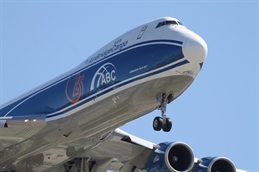
In November, the Volga-Dnepr Group took a large knife to the operations of its scheduled Boeing 747 carriers AirBridgeCargo (ABC) and CargoLogicAir, cancelling a total of 11 freighter connections out of Europe and Russia. Management had announced earlier that it would restructure the business, owing to results for the first half of 2019 having fallen below expectations. Cargo volumes declined 6% in the period, resulting in a net loss.
The fact that the cuts were made during the peak season suggests that the situation had deteriorated further, prompting management to step on the brakes during the busiest time of the year.
The group’s fleet and operations have undergone rapid expansion in recent years, and the downturn in the market, with the associated impact on yields, hit it hard, forcing a change of course.
Rather than chase volume, the focus now appears to be more on improving yield, with a stronger emphasis on premium traffic.
It is not a 180-degree turn for the carriers. Earlier this past year, ABC introduced a service called ABC premium, targeting customers with urgent, time-sensitive shipments. This can be combined with the airline’s existing products, such as its offerings for pharmaceuticals or aircraft engines.
In October, ABC obtained its renewed CEIV Pharma badge. According to Fedor Novikov, deputy general director, special products, the carrier’s pharma business climbed more than 20% in the first eight months of this year, which is in stark contrast with the development of its general freight business.
“We have significantly improved our service quality through continuous personnel training, collaboration with like-minded certified partners, and by following the path of digitalization to achieve higher pharmaceutical handling excellence,” said Novikov.
Other carriers have also been honing their capabilities in the premium cargo arena, especially with pharmaceuticals. Earlier in 2019 Emirates SkyCargo opened a 1,000 square metre pharma facility at Chicago O’Hare airport, which was subsequently certified as compliant with GDP guidelines. This is part of the carrier’s ‘Pharma Corridors’ initiative to offer enhanced protection for temperature-sensitive pharma shipments from origin to destination.
In Copenhagen, the airline moved its pharma handling operation to a dedicated pharma facility developed by ground handler Worldwide Flight Services (WFS), which is also GDP certified.
Swiss WorldCargo, one of the leading air carriers of pharmaceuticals, broadened its line-up of active temperature-controlled containers with the approval of the CSafe RAP unit for its fleet of widebody aircraft. CSafe Global’s latest ULD uses the company’s proprietary Vacuum-Insulated Panels technology in conjunction with a novel compressor-driven cooling and radiant heating system to maintain a precise set point temperature while providing up to 20 percent larger payload capacity than competing systems, according to CSafe.
At JFK airport, Swiss and handling agent WFS opened New York’s first GDP compliant pharma facility.
Airports are also stepping up their efforts to draw in pharma traffic. Hong Kong International Airport and Singapore Changi Airport have led drives for CEIV certification of carriers, handlers and forwarders on their patch.
“CEIV positions yourself ahead of the game in terms of transportation,” remarked Emir Pineda, manager, aviation trade and logistics in the marketing division of the Miami-Dade Aviation Department, which manages Miami International Airport. The airport has been in the vanguard of the CEIV drive and was a founder of the pharma.aero initiative that links CEIV certified airports.
“CEIV corridors are high on our agenda,” said Pineda.
Other airports are looking to obtain CEIV accreditation. In Canada, Edmonton International Airport is pursuing this. The airport authority in Vancouver is considering such a move. “We’ve been looking at CEIV,” said Jason Tse, manager, commercial leasing – cargo.
Shippers keep pushing up the bar. Andres Perez, head of business development at Swiss WorldCargo, thinks that before long CEIV accreditation will no longer be a mark of distinction for operators to stand out in the market but become a requisite element to qualify for business.
“It is going to be the industry standard,” he predicted. “If you don’t have CEIV, you are going to lose business.”
Even when the focus is not explicitly on pharmaceuticals or other premium types of cargo, some airport authorities are no longer content to accept any type of freight building. Atlanta’s Hartsfield Jackson International Airport has invited proposals for the development of a 63-acre patch of land for a cargo facility. The airport authority has not determined what the facility should be like, but some basic parameters are clear.
“We want to develop something that is state-of-the-art, something that is capable of handling different kinds of cargo that are relevant to the region, and it has to meet our general principle that cargo has to move at the speed of baggage,” said Elliott Paige, director of air services development.
The hunt for premium cargo looks bound to continue, as airlines face the prospect of further pressure on yields. In its global airline industry forecast released in December, IATA predicts that yield will remain on a downward trajectory, only mildly better than in 2019. After a drop of 5% in 2019, the airline body projects a slip of 3% for 2020, while cargo revenues are expected to contract 1.1%.
By Ian Putzger
Air Freight Correspondent | Toronto



